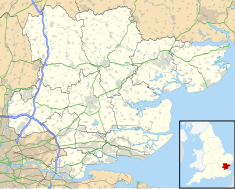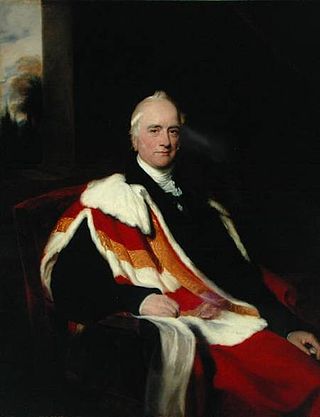
Nicholas Vansittart, 1st Baron Bexley, was an English politician, and one of the longest-serving Chancellors of the Exchequer in British history.
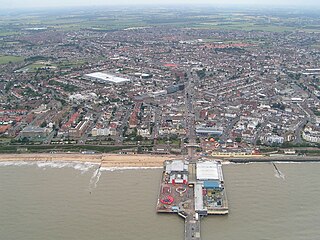
Tendring District is a local government district in north-east Essex, England. Its council is based in Clacton-on-Sea, the largest town. Other towns are Brightlingsea, Harwich, Frinton-on-Sea and Walton-on-the-Naze.

Manningtree is a town and civil parish in the Tendring district of Essex, England, which lies on the River Stour. It is part of the Suffolk Coast and Heaths Area of Outstanding Natural Beauty.

Harwich International railway station is a railway station on the Mayflower Line, a branch of the Great Eastern Main Line, the station serves Harwich International Port in Essex, England. It is 68 miles 72 chains (110.88 km) from London Liverpool Street, between Wrabness to the west and Dovercourt to the east. Its three-letter station code, HPQ, derives from its original name, Harwich Parkeston Quay.

Harwich and North Essex is a constituency represented in the House of Commons of the UK Parliament by Bernard Jenkin of the Conservative Party since its creation in 2010.

Mistley is a village and civil parish in the Tendring district of northeast Essex, England. It is around 11 miles northeast of Colchester and is east of, and almost contiguous with, Manningtree. The parish consists of Mistley and New Mistley, both lying beside the Stour Estuary, and Mistley Heath, a kilometre to the south. Mistley railway station serves Mistley on the Mayflower line.

Mistley railway station is on the Mayflower Line, a branch of the Great Eastern Main Line in the East of England, serving the village of Mistley, Essex. It is 61 miles 14 chains (98.45 km) down the line from London Liverpool Street and is situated between Manningtree to the west and Wrabness to the east. Its three-letter station code is MIS.

The Worcester Guildhall is a municipal building in the High Street, Worcester, England. It is a Grade I listed building.

Gloucester Guildhall is a former municipal building in Eastgate Street, Gloucester, which is now used as a arts and theatre venue. It is a Grade II listed building.
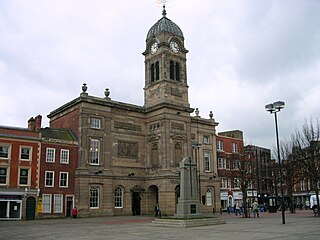
Derby Guildhall is a municipal building in the Market Place, Derby, England. It is a Grade II listed building.
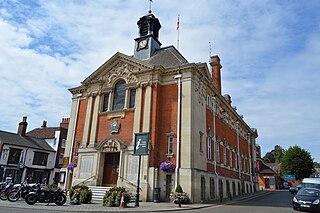
Henley Town Hall is a municipal structure in the Market Place in Henley-on-Thames, Oxfordshire, England. The town hall, which is the headquarters of Henley Town Council, is a Grade II* listed building.

Newport Guildhall is a municipal structure in the High Street in Newport, Isle of Wight, England. The guildhall, which was the headquarters of Newport Borough Council, is a Grade II* listed building.
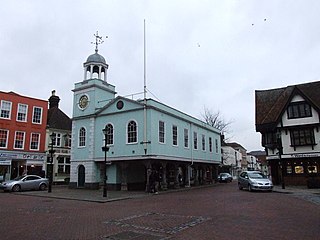
Faversham Guildhall is a municipal building in the Market Place in Faversham, Kent, England. The structure, which was the meeting place of Faversham Borough Council, is a Grade II* listed building.

Tiverton Town Hall is a municipal building in St Andrew Street in Tiverton, Devon, England. The structure, which was the meeting place of Tiverton Borough Council, is a Grade II listed building.

Ripon Town Hall is a municipal building in the Market Place, Ripon, North Yorkshire, England. The structure, which was the headquarters of Ripon Borough Council, is a Grade II* listed building.

Conwy Guildhall is a municipal structure in Rose Hill Street, Conwy, Wales. The guildhall, which is the meeting place of Conwy Town Council, is a Grade II listed building.

Helston Guildhall, also known as Helston Town Hall, is a municipal building in Church Street, Helston, Cornwall, England. The structure, which is the meeting place of Helston Town Council, is a Grade II* listed building.
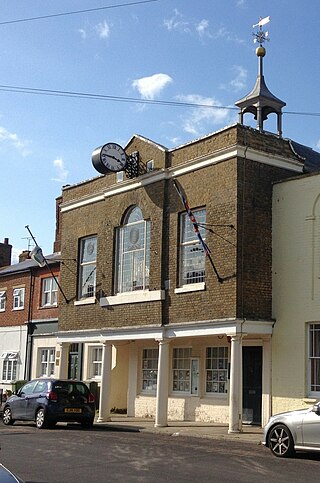
Queenborough Guildhall is a former municipal building in the High Street in Queenborough, Kent, England. The structure, which is currently used as a museum, is a Grade II listed building.

Brecon Guildhall, is a municipal building in the High Street, Brecon, Powys, Wales. The structure, which is the meeting place of Brecon Town Council, is a Grade II listed building.

Sandwich Guildhall is a municipal building in the Cattle Market, Sandwich, Kent, England. The structure, which accommodates the offices and meeting place of Sandwich Town Council, is a Grade II* listed building.

